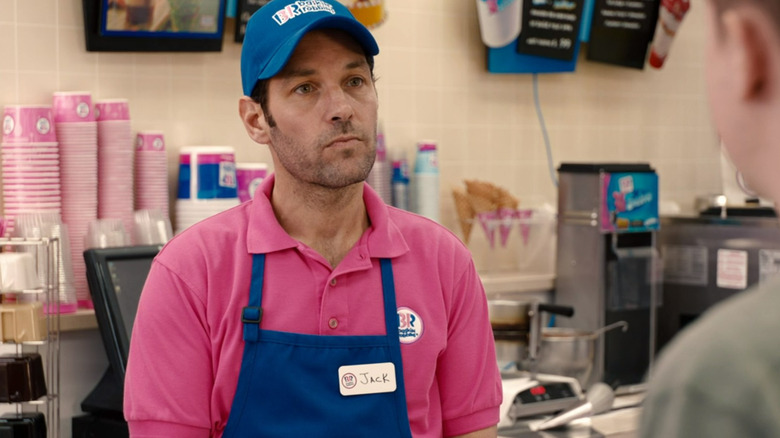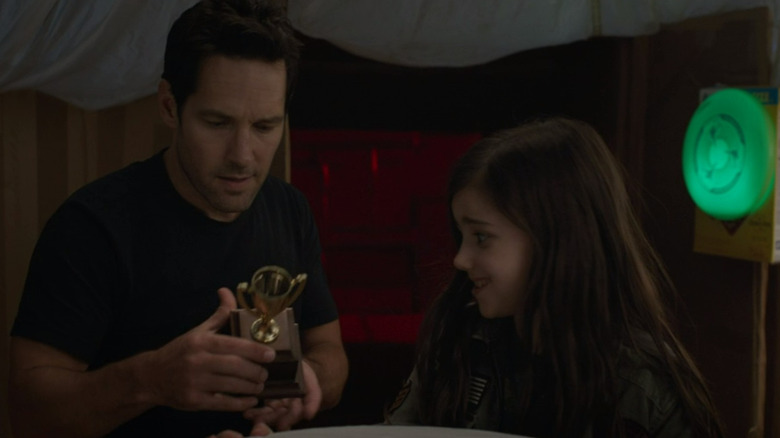Ant-Man 3 Producer Explains How To Keep The Marvel Cinematic Universe Relevant [Exclusive]
The Marvel Cinematic Universe is set to enter Phase 5 with "Ant-Man and the Wasp: Quantumania." Don't stress the terminology too much. The phases have always been loosely organizational in nature, and quantumania, well ... actually do maybe stress that one. Kind of sounds like an incurable illness. Directed by Peyton Reed, who previously directed the first and second "Ant-Man" installments, and starring an eclectic mix of fresh and familiar faces (we're particularly excited for Jonathon Majors, William Jackson Harper, and Bill Murray, also Corey Stoll is returning in a slightly different role? Movies are truly magic), "Quantumania" promises to kick off a new era of Marvel with a gravitas heretofore unseen in Scott Lang"s (Paul Rudd's) comical capers.
It's been a major selling point for the film, actually, that "Quantumania" is going to be this big, ominous thing, with permanent repercussions for the entire MCU. It's not just a tonal 180 for "Ant-Man" but also a shift in narrative relevance. Sure, Reed went on the record to remind everyone that his latest Marvel project is still technically a family drama but Ant-Man will be leading the first of many, many battles against Kang the Conqueror (Majors), something that will undoubtedly set the stage for what's to follow in subsequent movies.
But that's a lot for one little Ant-Man to shoulder. Fortunately, the higher-ups at Marvel seem to understand this, and within their ranks is a mentality that not only allows Reed's movie to breathe, but also to be Reed's movie first and foremost. To "Ant-Man" producer Stephen Broussard, it's this kind of support that keeps the MCU relevant in 2023. Here's the story, as shared by Broussard.
Marvel's relevance is fueled by modern directors
During an exclusive interview with /Film's Jeremy Mathai, Stephen Broussard explained how he believes that his duty as a producer is to uplift the voices of any given director who brings their talent into the Marvel Cinematic Universe. In his mind, supporting a variety of directors with distinct visions is what will fuel the MCU's continued relevance. Broussard explained that:
"I view my job as supporting [filmmakers] and as supporting their [voices] and putting [them] at the forefront. Because that is what will keep the MCU relevant ... a voice that steps forward ... that is unique to that film ... the interconnectivity is fun ... We like that these movies connect. But at the end of the day, [these movies] have to function on their own. And the best way to do that is by empowering a Peyton Reed to bring his voice to the table. James Gunn, Shane Black ... I think you see these filmmakers' voices come through loud and clear ... And the people that we've worked with know that, behind the scenes, we're all building it together ... we all want to make the best movie in support of this filmmaker."
Right about now is a great time to be thankful for /Film's lack of a comment section, as there are no shortage of opinions that claim that Marvel over-relies upon the cinematic interconnectivity to boost perceivably lesser projects. We've all heard some variation of that mindset before, and it might even be true to a degree, but Broussard's statement aligns nicely with the message Kevin Feige, Marvel's president, continues to preach — good standalone movies are the priority. Everything else is just super icing on the hero cake.

